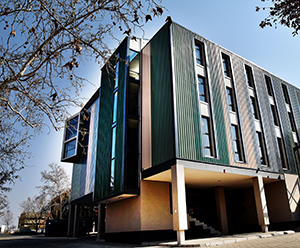Latest News Archive
Please select Category, Year, and then Month to display items
12 January 2024
|
Story Nonsindiswe Qwabe
|
Photo Sonia Small
 Since joining the UFS in 2008, Dr Grey Magaiza has worked extensively on approaches that can foster the socio-economic transformation of societies.
Since joining the UFS in 2008, Dr Grey Magaiza has worked extensively on approaches that can foster the socio-economic transformation of societies.
“The future should be one where communities can decide on their development agenda and futures. That’s the most important for me.” Dr Grey Magaiza, Deputy Director of the Centre for Gender and Africa Studies (CGAS) and Head of the Community Development programme on the Qwaqwa Campus, is passionate about capacitating communities to be agents of change and advancement. His vision for the future emphasises the empowerment of communities to take charge of their development by actively participating in decision making and the implementation of development projects that can improve their lives.
Since joining the UFS in 2008, Dr Magaiza has worked extensively on approaches that can foster the socio-economic transformation of societies. Over the years, he has crafted his research speciality into one that he is most proud of – being an interdisciplinary scientist immersed in the development of communities.
“I’m in a fortunate position of researching what I like. I say ‘fortunate’, because I’ve taken the time to understand what I’m passionate about, which is the overall field of rural livelihoods and livelihood futures – in short, community development. My research starts from an engaged university, understanding the elements that a university must use to enhance transformation and relevance to its immediate community in terms of development.”
One of the ways he has done this is by looking at social entrepreneurship as a development approach for young people in a rural setting. Through workshops with non-profit and civic organisations in Qwaqwa, Dr Magaiza has been helping these organisations to map out their needs and actively meet them through the involvement and support of external role players.
“We understand that communities are part of the national development agenda, but even that national agenda respects community knowledge and intentions and allows communities to shape their identity. A critical enabler of this is community organising. You bring back the capacity in communities to have dialogues on issues affecting them as spaces for engagement, knowledge exchange, and for people to just talk about their way forward.”
By enabling communities to define their development agenda, they can address their specific needs, challenges, and aspirations, he said. “When I look at livelihood futures, it’s quite an exciting aspect of my work – it’s like looking into a fortune tellers’ globe, because you’re not deciding for communities what they should do, but the communities themselves take those decisions.”
Expansion to Physics building officially opened on Bloemfontein Campus
2016-05-06

The newly-opened addition to the Physics Building on the Bloemfontein Campus.
Photo: Charl Devenish
|
An extension to the Department of Physics at the University of the Free State (UFS) was officially opened on the Bloemfontein Campus on 20 April 2016.
“This started off about five years ago when we were talking about not having enough room for large classes. Prof Matie Hoffman suggested that we build a large lecture room on our parking space,” said Prof Hendrik Swart, Professor in the Department of Physics as he addressed guests at the official opening ceremony.
“A year later, we received a Sarchi Research Chair [South African Research Chairs Initiative] on Advanced and Luminescent Materials. We needed more office and laboratory space. The two ideas were combined and presented to the university’s senior management,” he added.
When the university was founded in 1904, Prof James Lyle was appointed to head up the Physics and Chemistry departments. Five years later, a single room was allocated for the Physics laboratory in the main building upon its completion. In 1947, the old Physics building was designed and constructed. Fast forward 69 years, the department has reached another milestone. Facilities accommodated by the expansion include a new telescope for astrophysics experiments, a basement for storing old equipment, as well as a sliding trap door which allows heavy goods to be elevated into the building from the ground floor. The telescope is one of the many unique features of the building given its capacity to expose graduate students to the basic techniques of radio astronomy, especially in light of the fact that the SKA (Square Kilometre Array) project which is in progress.
“Our department is extremely strong at this stage, and a bright future lies ahead,” said Prof Koos Terblans, the Head of Department. The opening also served to celebrate the 103 publications achieved by the department last year.
Dr Lis Lange, Vice-Rector: Academic is proud of the heights reached by the department to date. “The Department of Physics is undoubtedly one of the jewels in the crown of our university, and we are very proud of its developments. Universities are built on legacies, and they are also about change, which is what this department has been demonstrating.”
The expansions to the building with its top-class facilities, was constructed at a cost of R25 million – an infrastructure grant courtesy of the Department of Higher Education and Training.